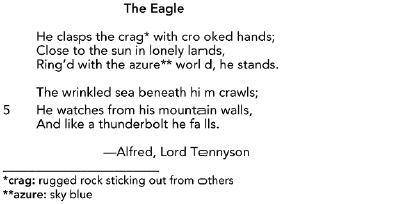
English, 06.04.2021 09:50 22moneymorgan
4. Literary Text: “The Eagle,” Alfred, Lord Tennyson
Read this poem by Alfred, Lord Tennyson. Then, answer the following question(s).
Which sound devices are used in line 1 of the poem?
a. assonance and consonance
b. alliteration and slant rhyme
c. assonance and alliteration
d. consonance and onomatopoeia
5. What does the simile in line 6 suggest about the eagle?
a. its slow but steady hunting style
b. its extreme hunger
c. its sharp eyes and beak
d. its speed and power
6. Which line from the poem reveals personification?
a. the blue sky above a mountain
b. the sound of an eagle's wings
c. the rough feeling of a mountain crag
d. the wrinkled sea beneath him crawls


Answers: 3
Another question on English

English, 21.06.2019 18:30
Read the excerpt below from "letter from birmingham jail" and then answer the question below: "my citing the creation of tension as part of the work of the nonviolent resister may sound rather shocking. but i must confess that i am not afraid of the word "tension." i have earnestly opposed violent tension, but there is a type of constructive, nonviolent tension which is necessary for growth. just as socrates felt that it was necessary to create a tension in the mind so that individuals could rise from the bondage of myths and half truths to the unfettered realm of creative analysis and objective appraisal, so must we see the need for nonviolent gadflies to create the kind of tension in society that will men rise from the dark depths of prejudice and racism to the majestic heights of understanding and brotherhood." how does king's repetition of the term "tension" impact the meaning of the text? question 5 options: dr. king says that he is afraid of the word tension and he doesn't think it is necessary. dr. king repeats the word tension to explain how he sees the word as a negative force that discourages change. dr. king repeats the word tension unintentionally, and it doesn't impact the meaning of the text. dr. king repeats the word tension to support how he views the word tension as positive and growth-producing.
Answers: 1

English, 22.06.2019 07:30
Read the passage below and answer the question. jake was incredibly loquacious. he once gave a twenty minute monologue about his favorite movie. in the passage above, the context clue used to find the definition of loquacious is an example of an antonym an example a synonym the tone of the whole phrase
Answers: 1

English, 22.06.2019 10:40
Read the passage. the dust bowl during the 1930s, extreme drought and high winds made life incredibly difficult in the great plains region of the united states. in many areas, rainfall was forty percent less than normal. the soil became extremely dry, and when strong winds blew, they created tremendous dust storms. these so-called “black blizzards” were so thick that they made daylight seem like dusk. during this terrible period, the great plains region of the united states was named the “dust bowl.” over the next few years, the drought continued, and the winds created more dust storms. in some places, the drought and high winds lasted for eight years. many people wondered if the black blizzards would ever end. which statement about this paragraph’s main idea is true? this paragraph’s main idea is stated in the topic sentence. there are not enough details to support the main idea. this paragraph’s main idea is implied. this paragraph does not express a main idea.
Answers: 1

English, 22.06.2019 12:00
In the sweet hereafter and the following poem, what does the newborn symbolize? "every death is magic from the enemy to be avenged" by brooks haxton when fever burned the last light out of my daughter's eyes, i swore to find and kill the ones to blame. men must mount the long boat in the dark with spears. at dawn, where the flowering spicebush hid my scent, i crouched. a young wife, newborn slung across her chest, came first for spring water. she stooped. my god, for vengeance, spoke her secret name inside my ear. her god stepped back with no scream, his right hand at his mouth, the knuckles clenched between the pointed teeth. death is not evil. innocence of childhood the continuing cycle of life and death the children that will never be born
Answers: 1
You know the right answer?
4. Literary Text: “The Eagle,” Alfred, Lord Tennyson
Read this poem by Alfred, Lord Tennyson. Then,...
Questions

Social Studies, 25.07.2019 16:30


Biology, 25.07.2019 16:30

Biology, 25.07.2019 16:30

Biology, 25.07.2019 16:30

History, 25.07.2019 16:30

Social Studies, 25.07.2019 16:30

Biology, 25.07.2019 16:30




History, 25.07.2019 16:30


English, 25.07.2019 16:30


History, 25.07.2019 16:30



English, 25.07.2019 16:30

Advanced Placement (AP), 25.07.2019 16:30



